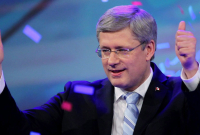Support strong Canadian climate journalism for 2025
OTTAWA — With the shadow of the Mike Duffy trial looming larger than ever, Stephen Harper is kicking off Week 2 of the federal election campaign with a headline−grabbing effort to crack down on homegrown terror threats.
Harper, keen to show off his bona fides as the experienced incumbent, promised to make it a crime for Canadians to travel to specific countries or regions where they could fight alongside groups officially identified by the federal government as terrorist organizations.
He says a re−elected Conservative government would establish "declared areas" — regions of the world where terrorist groups like the Islamic State of Iraq and the Levant hold control and use their base to recruit and train followers.
Foregoing casual campaign garb for the more prime ministerial suit and tie, Harper made his announcement at a news conference in Ottawa, flanked by Canadian flags.
He says national security agencies would track Canadians who travel to those areas; those who return would be required to prove they were in the region for humanitarian reasons, or as a journalist covering the conflict. Similar laws exist in Australia, which has designated parts of Iraq and Syria as no−travel zones.
On Wednesday, Duffy is scheduled to be back in court as the trial’s star witness takes the stand: Nigel Wright, Harper’s former chief of staff and the man who gave the disgraced former Conservative senator $90,000 to repay his disallowed housing and travel expenses.
Harper has long insisted that Wright acted on his own and did not say anything about the transaction to him or anyone else in his office. But he was asked Sunday about the trial — and in particular what Wright meant when he wrote in a February 2013 email that he’d been given a "good to go" from the prime minister.
"I did not know that Mr. Wright had made a payment to Mr. Duffy," Harper replied. "As soon as I learned that, I made that public. And Mr. Wright has been clear about that. This is the purpose of the process and those who are responsible and I’ll let the court do its work."
And "good to go"? "The words you’re quoting are not my words, they’re somebody else’s," he said.
When asked about the ramifications of his proposed anti−terror measure, Harper struck a defiant tone.
"There is no right in this country to travel to an area under the governance of terrorists; that is not a human right," he said to a barrage of partisan applause.
He acknowledged — grudgingly — that humanitarian workers, journalists and diplomats might "theoretically" have legitimate reasons for travelling to such a country.
"There will be exceptions in the law for those legitimate reasons, and I don’t think that people who have legitimate reasons will have difficulty showing those, but we know what other people are doing there," Harper said.
"That is something that we have to nip in the bud before trained terrorists return to this country."
Harper also volunteered an answer to a question he wasn’t asked, reacting to remarks made last week by "star NDP candidate" Linda McQuaig, who told a CBC panel discussion that for Canada to meet its climate change targets, "a lot of the oilsands oil may have to stay in the ground.’’
The comments contrasted with NDP leader Tom Mulcair, who has been open to oilsands development provided there is rigorous environmental protection and legislation to force oil companies to pay for pollution they create, including increased greenhouse gas emissions. Mulcair does, however, support a west−to−east pipeline for moving oilsands crude to market.
"That is the NDP’s not−so−hidden agenda on development," Harper said.
"The NDP is consistently against the development of our resources and our economy. That’s why they have been a disaster wherever they’ve been in government and why they would wreck this economy if they ever got in, and why they must never get into power in this country."
The Canadian Press



Comments